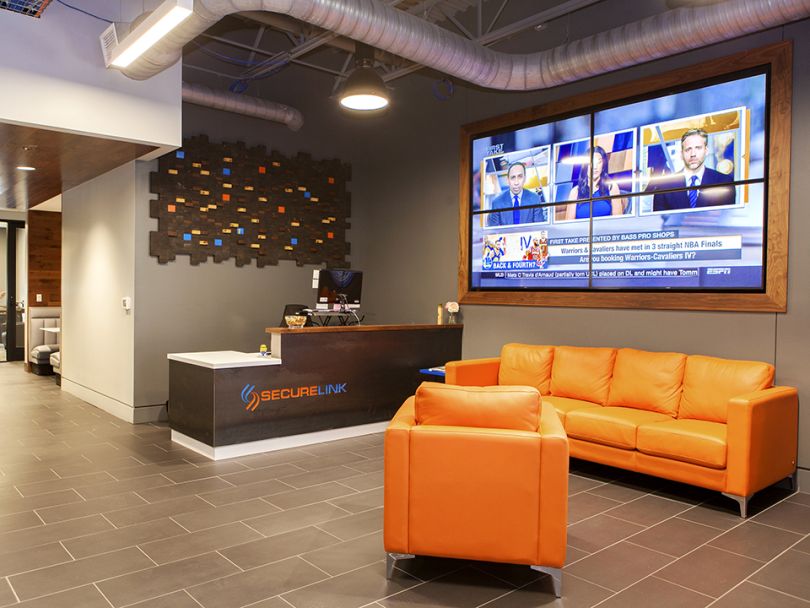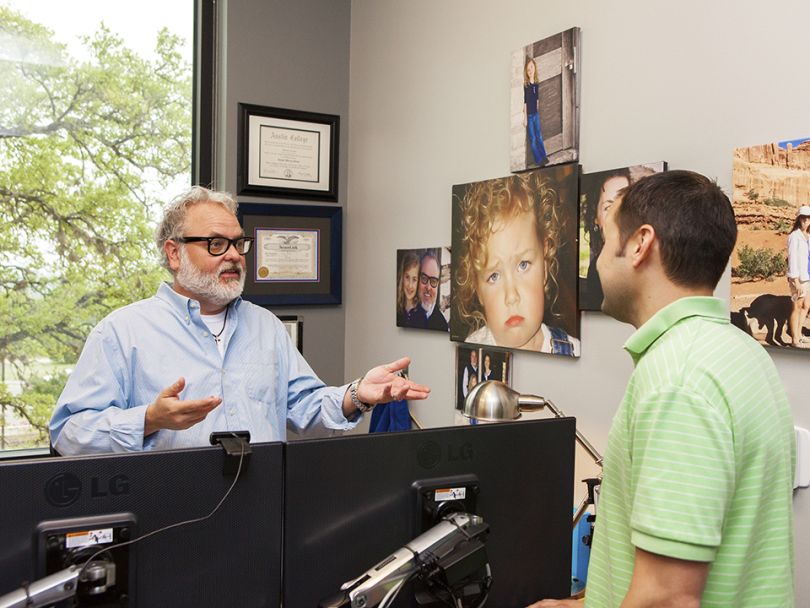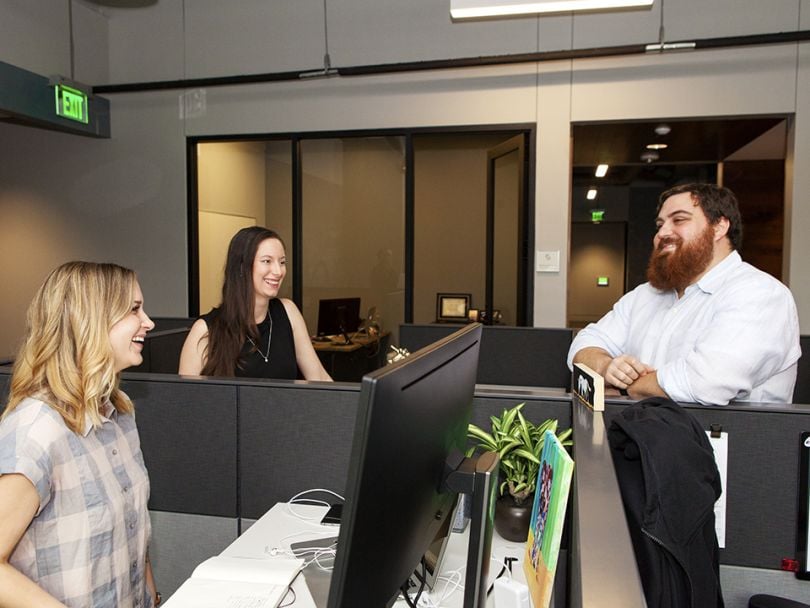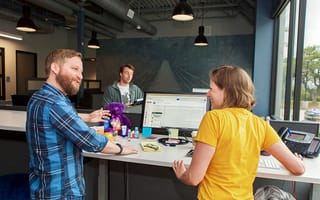You’ll pick up on SecureLink’s obsession with outer space immediately — when you walk into the lobby, a full-size astronaut suit is there to greet you.
“We like to think of ourselves as astronauts,” said CEO Jeff Swearingen.
That makes sense. The company is always willing to give nontraditional hires a shot. Its engineering crew is staffed with former teachers, firefighters and philosophy majors — people who broke into tech and are charting new territory for themselves and SecureLink.
We spoke with three leaders to find out how and why they hire this way — and why they use the image of a “space rocket” to depict their culture.



FOUNDED: 2003
EMPLOYEES: 65 local; 80 worldwide
WHAT THEY DO: SecureLink provides a security platform that ensures secure, accountable and auditable third-party remote access between technology vendors and clients in regulated industries like healthcare, law, government and more.
WHERE THEY DO IT: Austin, Texas
COME ON DOWN: Every Friday, employees who exemplify the company’s values are nominated to spin a Price Is Right-style wheel nicknamed the “Wheel of Glory” to win money.
BUZZ ME IN, BEAM ME UP: SecureLink’s office is nicknamed the Hill Country Spaceship and features a full-size astronaut suit in its lobby.

Jeff Swearingen, CEO
Swearingen sets big goals for his company, then ensures they achieve them.
BEYOND WORK: Swearingen enjoys surfing.
I understand the theme of space is featured prominently in your office. How did that come about?
The race to the moon in the 1960s is one of my favorite stories and a great parable for businesses charting new territory. In my opinion, landing 12 humans on the moon is the most impressive technological accomplishment of all time. We call our headquarters the Hill Country Spaceship. Our HQ features a full-size astronaut suit standing in our lobby and named our conference rooms after early NASA programs and astronauts.
What lessons from the field of space apply to your company, its culture and how you'd like to lead in your industry?
We like to think of ourselves as astronauts. We set high goals and work as a team using smarts, ingenuity, teamwork, humility and a relentless drive to improve. The security software business is competitive and unforgiving — much like space.
We like to think of ourselves as astronauts. We set high goals and work as a team using smarts, ingenuity, teamwork, humility and a relentless drive to improve.”
What's your vision for the future of SecureLink?
We were fortunate to be in a hot area of the security market, so the vision is to execute as fast as possible. We've been focused on third-party remote access for 15 years, but it wasn't an area that got much attention until the Target data breach a few years back. We aim to be the default platform for privileged access for third-party remote access, and we plan to have fun getting there.
What do you look for in an ideal candidate?
We don't care about where you went to school or if you even went to school. We look for smart, hungry and humble people who produce outsized results and play well on the team.


Joe Devine, President and COO
Devine sets the strategic direction and day-to-day operations of SecureLink for a wide array of teams, including technology, finance, legal, general operations and HR.
BEYOND WORK: He loves composing, recording and producing music with his daughter.
How does SecureLink approach hiring people with nontraditional backgrounds? What are the advantages to that?
We approach hiring with one priority in mind — hire smart people and let them grow. There are a couple advantages to this approach. Hiring someone who is smart at entry level is cost-effective, and hiring someone for a role outside of their expertise means they leave bad habits and preconceived notions behind.
One of our values here is about being great at your job and being willing to take on new challenges. People who are smart and get to learn new things tend to be motivated and have fun at their jobs.
We approach hiring with one priority in mind — hire smart people and let them grow.”
You display your cultural values on a graphic image called the “culture rocket.” Tell us more about your culture and how the rocket helps you stay aligned.
The culture here starts with the right employees and right customers. We want to do business with companies that see our strategic value and believe our products are a great fit. Thinking long-term is another aspect of the rocket. We make decisions for what's best if we ran this company for 20-plus years, not just for a fiscal quarter. This helps us think strategically rather than tactically.
The concept of “play to win” is becoming a more important part of the culture. We have lofty financial targets, and only the best players will make the cut. In general, the culture rocket helps inform the day-to-day decisions we make.
Tell me about a company or team tradition or ritual. Why is it meaningful?
We have what’s called the “Wheel of Glory.” One of our corporate goals is to have fun and celebrate success. Each week, anyone in the company can nominate a person for being what we call “slinky.” That means they’re great at their job, willing to take on more and are also caring. They introduce nominees at our internal happy hours on Friday afternoons and explain how that person’s work aligns with our goals. The nominee then spins a Price-Is-Right-style wheel to win cash.


Joel Burleson-Davis, VP of Technology
Burleson-Davis oversees all aspects of technology for the company. His mission is to ensure the product continues to be successful for customers.
BEYOND WORK: Burleson-Davis is an avid bread maker. He takes two lessons from this: First, a good sourdough needs time, (so too does a successful team). Second, welcome unexpected results. Good or bad, there’s a lot to glean from the experience.
We understand SecureLink hires people from nontraditional backgrounds. Tell us the advantage of doing so. Why do you hire this way?
I have a team full of non-traditional hires: systems engineers who were firefighters, services folks who were lawyers and senior developers who had been school teachers. We take seriously the idea that the best idea wins. That influences our approach to hiring.
We've found that if we're willing to hold back our biases on a person's background and hire in order to hire the most capable candidates, those candidates are more interested, motivated and cooperative. Sometimes our best option for a developer will be a seasoned coder, but it could also be the young high school teacher who wants to break into tech.
Sometimes our best option for a developer will be a seasoned coder, but it could also be the young high school teacher who wants to break into tech.”
Tell us about your background.
I'm a hybrid in terms of background. In high school, I took advanced math and computer science classes and worked as an assistant for the school’s IT team. However, I turned down offers from larger universities to go to a liberal arts school in Texas. Math and computer science came easy. I wanted a challenge like philosophy, ethics and ancient languages. So, I double majored in ethics and philosophy and double minored in history and Greek.
The experience enriched my mind and life. However, no one wanted to hire someone with a background like mine, and it didn’t help that I moved to Western Australia during the financial crisis. So I returned to tech and found a gig as a systems engineer with an engineering company. I merged these experiences in graduate school, where I studied systems science. Then I joined SecureLink.
Did you learn any lessons that apply to your work today?
I learned that if someone has the traits you're after, it makes sense to give them a chance. I learned that business and technology are complex. No single frame of reference can help in all situations. I'm intentionally conscientious of the organizational, personal and technological dynamics because of my background.
What's the biggest challenge facing the security software industry? What are you doing to help your company overcome it?
Compliance and the commoditization of hacking are the biggest challenges. Those two things perpetuate each other. Compliance efforts are attempting to get ahead of hacking efforts by placing constraints on software, teams and policies, while hacking tools are becoming more sophisticated and accessible.
This leads to compliance solutions that can be too rigid to respond to the changing dynamic of hacking, and the response from organizations is often to add in more rigidity. SecureLink is building a tool that allows companies to satisfy compliance requirements but is also flexible and secure enough to diminish the threat of a breach.
How does the culture rocket inform your work?
The culture rocket embodies the culture we've built at SecureLink and helps to reinforce what's important moving into the future. Those values are: the right customers, the right employees, speak up and offer solutions.
As a leader, if someone who works for me is willing to speak up and offer a better idea that conflicts with mine, it means we've done well and the culture depicted in our culture rocket is strong.

Jacob Venard, Director of Customer Success
Venard leads the team responsible for implementing the company’s solutions for new customers. The team works to deploy the product to each client’s site, grow its use in their operations and ensure they are satisfied.
BEYOND WORK: He runs a tabletop gaming group of friends and coworkers.
How does your background inform your work today? Did it make you a better leader or technologist?
My background is in biological research. In school, I worked in a medical school laboratory and a neuroscience graduate research program. After school, I transitioned to coordinating Phase One pharmaceutical research studies. I learned collaborative skills and how to coordinate multiple departments composed of dozens of people.
When I decided that I didn’t want to pursue the few paths to advancement that were available, I looked broader. With SecureLink, I saw an opportunity to apply the skills I honed in coordinating research projects and handling research clients. Those skills gave me a solid base to build my career and an appreciation for our clients. They see the need for our solution but need assistance in understanding and implementing the software. I went through that same process.
What are the advantages of hiring people from diverse backgrounds?
Focusing on the individual and their abilities rather than their past experience gives us a tremendous advantage. A personality fit is more crucial given the extent to which we collaborate. We can teach a new hire how to oversee a project or how the SecureLink product works, but it's much more difficult to teach insight and creativity when working with a customer.
We can teach a new hire how to oversee a project or how the SecureLink product works, but it's much more difficult to teach insight and creativity.”
What is the biggest challenge you asked your team to tackle? How did you help your people meet the goal?
Our biggest challenge is reducing the time it takes for a new customer to get fully operational and rolled out with the tools SecureLink provides. Each customer has a unique set of circumstances, and setting a formula for pushing that implementation forward can be tricky.
While the project milestones are set, each project manager is given the flexibility to try different engagement efforts and conversational strategies on a weekly basis. We meet twice a month to discuss the project on a global scale. I want to give them the opportunity to shape their daily processes rather than dictate them. It allows them to grow their skill set and identify areas for improvement.





